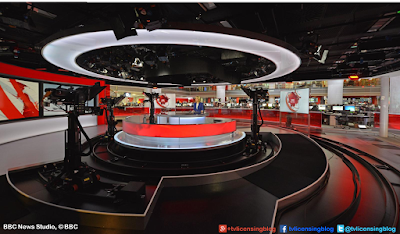The BBC has announced a newsroom shake-up that will see savings of £80 million at the cost of 450 jobs.
The Director of BBC News, Fran Unsworth, outlined the plans to a gathering of soon to be ex-colleagues earlier today.
News output will be reorganised along a 'story-led' model, focusing on news stories more than on programmes or platforms. The intention is to reduce duplication (like the farcical simulcasting of programmes on BBC Two and BBC News channels) and to ensure that BBC journalism is making as much impact as possible with a variety of audiences, rather than stories only appearing on one outlet or platform.
The new way of working will mean a changed focus for the news agenda, to ensure it is tailored to subjects that matter most to the audience. The changes mean there will be a reduction in the overall number of stories covered. The BBC's news operation will also be made less London-centric, with journalists being relocated to the Regions.
The BBC has also announced the following changes:
- The Victoria Derbyshire programme on television will close later this year;
- There will be a reduction in the number of films produced by Newsnight, which will lead to post closures. The programme will stay at the same length and timing and will continue to deliver high quality journalism on the day's events;
- There will be post closures at 5 Live driven by the changing listening habits of the audience and demand for digital content;
- World Update on World Service English will be closed, alongside other schedule changes. This is in addition to the changes to Asian language services outlined last year;
- There will be a review of the number of BBC News presenters and how they work.
Unsworth, who receives a salary of £340,000, said: "The BBC has to face up to the changing way audiences are using us. We have to adapt and ensure we continue to be the world’s most trusted news organisation, but crucially, one which is also relevant for the people we are not currently reaching.
"We need to reshape BBC News for the next decade in a way which saves substantial amounts of money. We are spending too much of our resources on traditional linear broadcasting and not enough on digital.
"Our duty as a publicly funded broadcaster is to inform, educate, and entertain every citizen. But there are many people in this country that we are not serving well enough.
"I believe that we have a vital role to play locally, nationally and internationally. In fact, we are fundamental to contributing to a healthy democracy in the UK and around the world. If we adapt we can continue to be the most important news organisation in the world."
Michelle Stanistreet of the National Union of Journalists said: "These damaging cuts are part of an existential threat to the BBC and a direct consequence of the last disastrous, secret licence fee deal the BBC agreed with the Government. This is before the impact of taking over responsibility for the over-75s licences kicks in.
"Against this backdrop, the BBC's very existence is being threatened with public service broadcasting under unprecedented threat.
"If the Government goes ahead and decriminalises non-payment of the licence fee, we know the impact will be further losses for the BBC of around £200 million a year and increased collection costs of £45 million.
"Such a politically-motivated move - dressed up as concern for the mythical imprisonment of vulnerable members of society - will serve to undermine one of the UK's strongest success stories, emasculating a brand renowned and respected across the globe."
At Prime Ministers Questions earlier today Boris Johnson was asked if the BBC was "a mortal enemy of the Conservative Party, or a cherished British institution that should be funded by the licence fee?"
Very tellingly, the Prime Minister gave no response to the second part of that question.
If you've found this article useful please consider liking us on Facebook, following us on Twitter or downloading our free ebook.


No comments:
Post a Comment